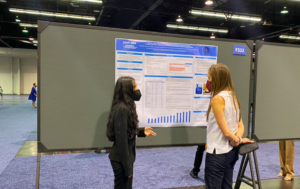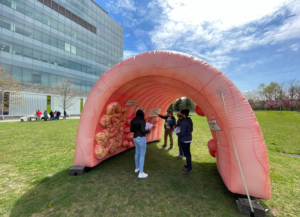Every year, over 118,000 New Yorkers are diagnosed with cancer, making it the second leading cause of death in the state, according to the latest report from the New York State Department of Health. In 2019, 33,651 New Yorkers died of cancer.
In an effort to increase the quality and duration of life in diverse, underserved communities, City College’s Partnership Community Outreach, Research and Education Core, or PCORE, is promoting access to cancer services and providing education on healthy behaviors.
CUNY School of Medicine professor Erica Lubetkin and graduate student Gabriela Rebollo are members of the partnership, supporting community members and researchers focused on reducing cancer disparities in their communities.

Student interns present at Annual Biomedical Research Conference for Minoritized Students in November 2022
The PCORE initiative is an outgrowth of the CCNY and Memorial Sloan Kettering Cancer Center Partnership, which was founded in June 2002 with funding from the National Cancer Institute. The aim of the partnership is to support basic and applied cancer research initiated by CCNY and MSK investigators, as well as to “implement joint education and training opportunities to attract minority students at all levels in their careers in cancer research, and to support their career development,” according to its mission statement.
The partnership’s work spans different levels of prevention. Stopping cancer from occurring at all would be considered primary prevention while screening for early cancer detection would be considered secondary prevention. By contrast, tertiary prevention aims to reduce the severity of cancer.
“Screening for certain types of cancer when someone is asymptomatic may lead to early detection and better outcomes with effective treatment,” Lubetkin said.
On a day-to-day basis, the task of PCORE consists of working with community-based organizations to provide workshops around healthy living, and cancer screenings for breast, cervical, colorectal, and prostate cancers. The team also organizes tabling events and health fairs in partnership with MSK, designed to help community members navigate the healthcare system and their health insurance, as well as to provide access to free cancer screening appointments and primary care.
In addition to the expertise in cancer and cancer prevention, the team also assists community members with various health-related concerns.
“Maybe they have a really bad toothache or back pain and they don’t want to focus on cancer screening and so we try to meet them where they are, to really help them find that care,” Rebollo said.
The CCNY-MSK initiative has impacted both the researchers and the communities it serves. The partnership has enabled CCNY and MSK faculty members to collaborate for a common goal.
“I think, on the individual investigator level, having those multifaceted collaborations and skill sets that we don’t necessarily have in our department is really good. It also provides new opportunities to students,” Lubetkin said.

Student volunteers demonstrating the Inflatable Colon in Harlem Health Expo in CCNY
The partnership has also had a positive influence on the community throughout the years because of the access to healthcare resources for people in need.
Outreach is conducted across different communities to maximize access to quality care, screenings, and follow-ups. MSK even has a mobile health unit for its outreach.
The Supportive Interventions to Overcome Grief and Loss through Advocacy and Community Engagement Project, or SOLACE, focused specifically on reaching practitioners from churches and mosques in Harlem and Brooklyn. This project stemmed from PCORE’s Discrimination and Health Working Group as a response to the COVID-19 pandemic’s widening of the existing health inequities and the protests for racial justice.
Rebollo explained that navigating cancer screening appointments can be a month-long process and that after PCORE has helped them, some patients reach out to express gratitude. Patients of PCORE also tend to become more proactive about their health if further follow-ups are needed.
“They’re really thankful that we can just be with them throughout that process and how the MSK Ralph Lauren Center is very comfortable, or how they finally feel more at peace knowing their results,” Rebollo said.
Lylia Saurel is a writer for the RICC and recent graduate from Baruch College, where she was awarded Institutional Investor in Journalism. She holds an AA in Writing and Literature and a BA in Journalism and Intercultural communications. She is a former reporter for Dollars & Sense and copy editor for The Ticker. Her work has appeared in The Ticker, D&S Magazine, Daily Planet online edition and others. In addition to written journalism, she enjoys photojournalism and the visual arts.